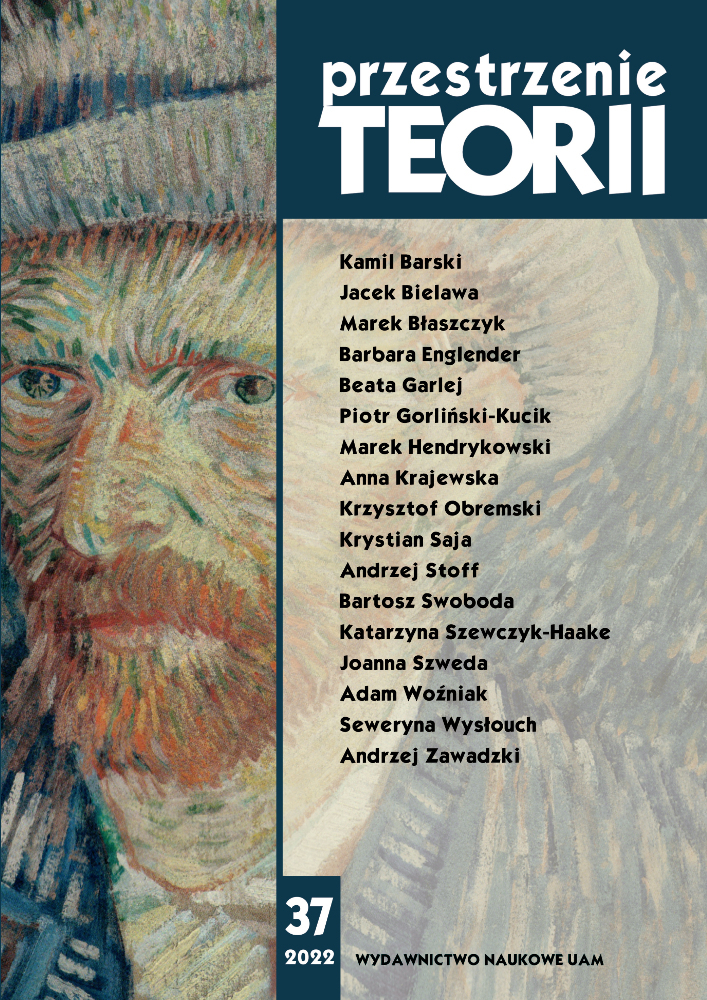Abstract
Using the concepts of Michel Foucault’s technologies of the Self and Peter Sloterdijk’s anthropotechnics, the article attempts to create a theoretical model of literature as a tool for converting a literary subject. This model distinguishes three forms of the Self that are revealed in the process of conversion carried out in the medium of literature: the Self as subject, the Self as object and the other Self. Within the relations between these three incarnations, three conversion processes have been distinguished: asceticism – understood as an exercise in writing, acrobatics – as an act of literary secession to another world, and alethurgy – a textual technique of self-knowledge. Ultimately, this theoretical model is presented in the form of a conversion triangle.
References
Avanessian A., Hennig A., Metanoia. A Speculative Ontology of Language, Thinking, and the Brain, przeł. N.F. Schott, London–New York 2019.
Bachtin M., Autor i bohater w działalności estetycznej, [w:] tegoż, Estetyka twórczości słownej, przeł. D. Ulicka, Warszawa 1986.
Batson D.C., Ventis L.W., The Religious Experience. A Social-Psychological Perspective, New York 1982.
Bielik-Robson A., Inna nowoczesność. Pytania o współczesną formułę duchowości, Kraków 2000.
Brion F., Harcourt B.E., Posłowie. Kontekst wykładów z Louvain, przeł. M. Burzyk, [w:] M. Foucault, Zło czynić, mówić prawdę. Funkcja wyznania w sprawiedliwości. Wykłady z Louvain. 1981, przeł. A. Zawadzki, Kraków 2018, s. 344–345.
Dankel T.M., To Become Again What We Never Were: Foucault and the Politics of Transformation, Cambridge 2015, <http://nrs.harvard.edu/urn-3:HUL.InstRepos:14226059> [dostęp: 6.11.2020].
Devitt R., Foucault and Literature: Finitude, Feigning, Fabulation, Waterloo 2014, <https://uwspace.uwaterloo.ca/handle/10012/9234> [dostęp: 6.11.2020].
Foucault M., Filozofia, historia, polityka. Wybór pism, przeł. D. Leszczyński, Warszawa–Wrocław 2000.
Foucault M., Foucault Live. Collected Interviews. 1961–1984, red. S. Lotringer, New York 1996.
Foucault M., Hermeneutyka podmiotu, przeł. M. Herer, Warszawa 2016.
Foucault M., Historia seksualności, przeł. B. Banasiak, T. Komendant, K. Matuszewski, Warszawa 2000.
Foucault M., Inne przestrzenie, przeł. A. Rejniak-Majewska, „Teksty Drugie” 2005, nr 6, s. 117–125.
Foucault M., Kim jest autor?, przeł. M.P. Markowski, [w:] tegoż, Powiedziane, napisane. Szaleństwo i literatura, przeł. B. Banasiak, T. Komendant i in., Warszawa 1999.
Foucault M., Remarks on Marx. Conversations with Duccio Trombadori, przeł. R.J. Goldstein, J. Cascaitos, New York 1991.
Foucault M., Rządzenie sobą i innymi, przeł. M. Herer, Warszawa 2018.
Foucault M., Rządzenie żywymi, przeł. M. Herer, Warszawa 2014.
Foucault M., Słowa i rzeczy. Archeologia nauk humanistycznych, przeł. T. Komendant, Gdańsk 2006.
Foucault M., Sobąpisanie, przeł. M.P. Markowski, [w:] tegoż, Powiedziane, napisane. Szaleństwo i literatura, Warszawa 1999.
Foucault M., Szaleństwo, literatura, społeczeństwo, przeł. M. Kwietniewska, [w:] tegoż, Powiedziane, napisane. Szaleństwo i literatura, Warszawa 1999.
Freundlieb D., Foucault and the Study of Literature, „Poetics Today” 1995, nr 2, s. 301-344. https://doi.org/10.2307/1773331
Hadot P., Ćwiczenia duchowe i filozofia starożytna, przeł. P. Domański, W. Klenczon, Warszawa 2019.
Harpham G.G., The Ascetic Imperative in Culture and Criticism, Chicago and London 1987. https://doi.org/10.7208/chicago/9780226316901.001.0001
Iser W., Czym jest antropologia literatury? Różnica między fikcjami wyjaśniającymi a odkrywającymi, przeł. A. Kowalcze-Pawlik, „Teksty Drugie” 2006, nr 5, s. 11–35.
Kapusta A., Filozofia ekstremalna. Wokół myśli krytycznej Michela Foucaulta, Lublin 2002.
Nycz R., Język modernizmu. Prolegomena historycznoliterackie, Toruń 2013.
Nycz R., Literatura jako trop rzeczywistości. Poetyka epifanii w nowoczesnej literaturze polskiej, Kraków 2001.
Podniesiński M., Wielkie zamknięcie. Etyczne konsekwencje śmierci człowieka, „Kwartalnik Filozoficzny” 2011, nr 4, s. 133–155.
Ricoeur P., O sobie samym jako innym, Warszawa 2003.
Riffaterre M., Semiotyka intertekstualna: interpretant, przeł. K. i J. Faliccy, „Pamiętnik Literacki” 1988, nr 1, s. 302.
Sendyka R., Od kultury Ja do kultury Siebie. O zwrotnych formach w projektach tożsamościowych, Kraków 2015.
Sloterdijk P., Musisz życie swe odmienić. O antropotechnice, przeł. J. Janiszewski, Warszawa 2014.
Warmbier A., Tożsamość, narracja i hermeneutyka siebie. Paula Ricoeura filozofia człowieka, Kraków 2018.
Wittgenstein L., Uwagi o religii i etyce, przeł. M. Kawecka, W. Sady, W. Walentukiewicz, Kraków 1995.
License

This work is licensed under a Creative Commons Attribution-NonCommercial-NoDerivatives 4.0 International License.
Authors
Authors of texts accepted for publication in Przestrzenie Teorii are required to complete, sign and return to the editor's office the Agreement for granting a royalty-free license to works with a commitment to grant a CC sub-license.
Under the agreement, the authors of texts published in Przestrzenie Teorii grant the Adam Mickiewicz University in Poznań a non-exclusive, royalty-free license and authorize the use of Attribution-NonCommercial-NoDerivatives 4.0 International (CC BY-NC-ND 4.0) Creative Commons sub-license.
The authors retain the right to continue the free disposal of the work.
Users
Interested Internet users are entitled to use works published in Przestrzenie Teorii since 2015, for non-commercial purposes only, under the following conditions:
- attribution - obligation to provide, together with the distributed work, information about the authorship, title, source (link to the original work, DOI) and the license itself.
- no derivatives - the work must be preserved in its original form, without the author's consent it is not possible to distribute the modified work, such as translations, publications, etc.
Copyrights are reserved for all texts published before 2015.
Miscellaneous
Adam Mickiewicz University in Poznań retains the right to magazines as a whole (layout, graphic form, title, cover design, logo etc.).

